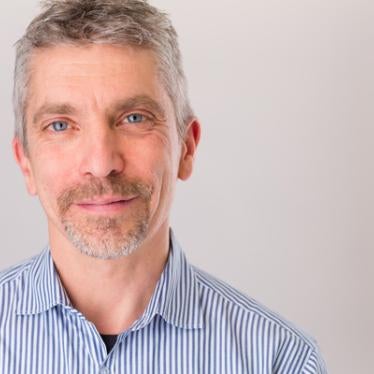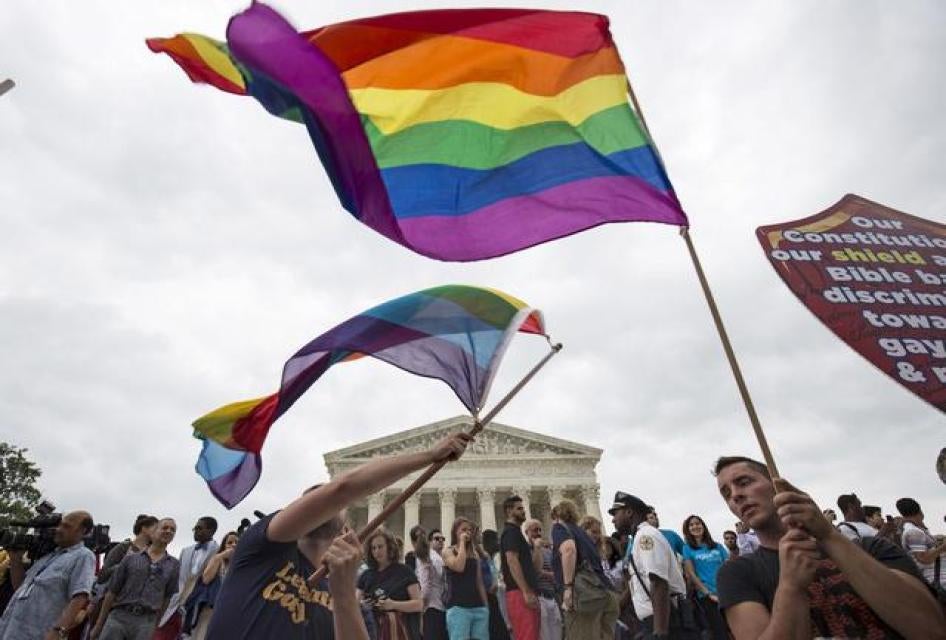The U.S. Supreme Court decision on marriage equality on Friday resonated deeply not only with lesbian and gay Americans, but with the LGBT community around the globe.
For same-sex couples and their families in the United States, the ruling opens new life possibilities that were not available the day before, while for many around the world, the symbolic weight of the judgment will help to affirm a sense of courage and dignity in the face of prejudice and discrimination, as it has in Ireland, Canada, New Zealand, South Africa and Argentina.
And yet, marriage equality is also likely to give further ammunition to tyrants who use homophobia for political ends. Indeed as the human rights of lesbian, gay, bisexual and transgender people have been affirmed around the world, so has the use of homophobia for political ends.
Take the example of Nigeria's former president, Goodluck Jonathan, who used "same-sex marriage" as a ruse to shore up his flagging political fortunes.
In the face of serious security threats from Boko Haram, corruption scandals and a party divided over his aspirations for a second term, Jonathan signed into law the Same-Sex Marriage (Prohibition) Bill. The law goes much further than outlawing marriage. It criminalizes public displays of affection between same-sex couples and penalizes the work of organizations supporting the rights of lesbian, gay, bisexual and transgender people.
Two weeks before the presidential election in March, Jonathan's spokesperson, Femi Fani-Kayode, accused the presidential opponent, Muhammadu Buhari, of entering into a Faustian pact with four unspecified Western nations to introduce same-sex marriage in Nigeria in exchange for supporting his candidacy.
To his credit, Buhari ignored the bait and won the election. Jonathan's cynicism didn't pay off. What remains to be seen, though, is whether he will confront Nigeria's problems head-on or box phantoms like his predecessor. A good signal would be to get rid of Jonathan's dangerous law.
But Jonathan is not alone.
In a report released June 1, the Office of the High Commissioner for Human Rights decried the tendency for political leaders to stir up prejudice through homophobic rhetoric, especially during elections. The political use of homophobia has become a ubiquitous part of the contemporary political landscape, with ruling elites from Gambia, Malaysia, Egypt and Russia among others using LGBT crackdowns for short-term political gain.
Recently, a number of sweeping anti-LGBT laws have proved particularly popular as political tools. Legislation that bans "propaganda," "promotion" or even expressions of support for LGBT groups is an effective ban on ideas, affiliations and social activities as well as public expressions of identity and affection.
As a consequence of their vague legal language, these laws give sweeping powers to governments wishing to curb opposition. It's easy to criminalize one's political opponents by accusing them of violating moral laws.
Legislation that seeks to outlaw public expression of identity is almost always accompanied by broader attacks on nongovernmental groups, activism and political dissent. And that really is the point: A clampdown on LGBT people provides the cover for curtailing civil society as a whole.
Accusing people of homosexuality for blatantly political purposes is not new.
King Henry VIII used his 1533 Buggery Act to accuse Catholic monks of sodomy as pretext for confiscating their land, disguising it as a moral crusade. The same law also proved a good mechanism to dispose of his irksome rival, Walter Hungerford, who was executed for "buggery" in 1540.
The reality is that widespread homophobia exists in many societies around the world, and those in power use it as a tool to bolster legitimacy, increase popularity and distract from pressing social ills.
By scapegoating a largely invisible and unpopular minority, states create a moral panic -- a perceived threat to the social order, which can easily escalate into a witch hunt. They're a convenient change of subject for political leaders facing rampant unemployment, political unrest, and spiraling economies.
In October, Gambia's embattled President Yahya Jammeh accused the EU of trying to foist same-sex marriage on his small West African country and passed a law in October outlawing "promotion of homosexuality" -- a literal cut and paste from a section of a Ugandan anti-LGBT law. Based on information extracted through their usual brutal tactics, his secret police began rounding up LGBT people; the timing of the attack on gay people is no coincidence. As Jammeh feels the heat of international pressure and his increasingly precarious position in Gambia as the economy flails, he appeals to homophobia.
Successive Malaysian governments, meanwhile, have used the country's colonial era sodomy law to silence Anwar Ibrahim, a former deputy prime minister and the parliamentary opposition leader.
In February, the Federal Court of Malaysia, the country's highest court, upheld a lower court ruling and sentenced him to five years in prison for violating the sodomy law. The decision stripped Anwar of his seat in parliament. And since Malaysian election law provides that anyone imprisoned for a year or more is banned from politics for five years, the conviction effectively ends the 67-year-old Anwar's political career.
And in Russia, President Vladimir Putin wears a mantle of "traditional values" as political armor that works for him domestically and also internationally, as part of his anti-Western rhetoric.
At a national level this appears in the form of "gay propaganda" laws. Internationally, Russia is leading an aggressive charge against the rights of LGBT people at the United Nations: Speaking at the U.N. Human Rights Council in March 2014, Russian Foreign Minister Sergey Lavrov caricatured recent human rights advances for marginalized people as resulting from "[s]upporters of ultraliberal approaches, supporting all-permissiveness and hedonism, requesting a revision of moral values."
Using homophobia for political ends is a way, of course, to draw attention away from real problems. But to paraphrase an adage: The way a society treats its minorities -- including LGBT people -- is a good measure of democracy.
The United States is one of 21 countries to permit same-sex marriage, but 78 still outlaw same-sex intimacy. What seems distinct about this particular time in our history is the way that LGBT rights have become a kind of lightning rod for competing visions of the world.










